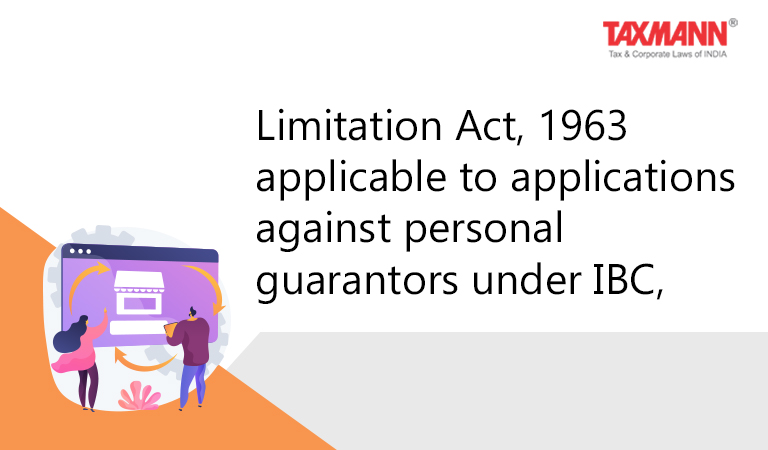Limitation Act, 1963 applicable to applications against personal guarantors under IBC, 2016
- Blog|News|Insolvency and Bankruptcy Code|
- 2 Min Read
- By Taxmann
- |
- Last Updated on 1 September, 2021

[2021] 129 taxmann.com 351 (Article)
With respect to Part, I of the Code, sections 7, 9, and 10 of the Code plainly ordain that an application can be filed by a financial creditor against a corporate debtor. Such a corporate debtor can either be a corporate person, who had borrowed money or a corporate person, who gives a guarantee regarding repayment of money borrowed by another corporate person. In other words, the Code cannot apply in respect of the “debts” of an entity that is not a “corporate person”. The Adjudicating Authority, in such cases, would be the National Company Law Tribunal.
With respect to Part III of the Code, under section 179, the DRT is the Adjudicating Authority for insolvency resolution for all other categories of individuals and partnership firms. Section 179 itself is “subject to Section 60”.
As per section 60(2), as far as it relates to insolvency resolution, liquidation, or bankruptcy of personal guarantors of such corporate debtors, the applications shall be filed before the NCLT where proceedings relating to corporate debtors are pending. Furthermore, Section 60(3) provides for a transfer of proceedings relating to personal guarantors to that NCLT which is dealing with the proceedings against corporate debtors. After providing for a common adjudicating forum, Section 60(4) vests the NCLT “with all the powers of the DRT as contemplated under Part III of this Code for the purpose of sub-section (2).” Section 60 (4) thus (a) vests all the powers of DRT with NCLT and (b) also vests NCLT with powers under Part III. Parliament has, therefore, merged the provisions of Part III with the process undertaken against the corporate debtors under Part II, for the purpose of Section 60(2), i.e., proceedings against personal guarantors along with corporate debtors. Section 179 is the corresponding provision in Part III. It is “subject to the provisions of Section 60”. Section 60 (4) clearly incorporates the provisions of Part III in relation to proceedings before the NCLT against personal guarantors.
Calculation of limitation period
Though the application of the Limitation Act, 1963 has not been specifically extended to personal guarantors, an application filed against a personal guarantor under the Insolvency & Bankruptcy (Application to Adjudicating Authorities for Insolvency Resolution Process for Personal Guarantors) Rules, 2019 (“Personal Guarantor Rules”) would be barred under Article 137 of the Limitation Act, 1963 if the default has occurred over three years prior to the date of filing of the application. This is so as section 238-A of the Code makes it clear by providing that the provisions of the Limitation Act, 1963 apply to the proceedings before both the Adjudicating Authorities under the Code i.e., the National Company Law Tribunal and the Debt Recovery Tribunal.
Click Here to Read the Full Article
Disclaimer: The content/information published on the website is only for general information of the user and shall not be construed as legal advice. While the Taxmann has exercised reasonable efforts to ensure the veracity of information/content published, Taxmann shall be under no liability in any manner whatsoever for incorrect information, if any.

Taxmann Publications has a dedicated in-house Research & Editorial Team. This team consists of a team of Chartered Accountants, Company Secretaries, and Lawyers. This team works under the guidance and supervision of editor-in-chief Mr Rakesh Bhargava.
The Research and Editorial Team is responsible for developing reliable and accurate content for the readers. The team follows the six-sigma approach to achieve the benchmark of zero error in its publications and research platforms. The team ensures that the following publication guidelines are thoroughly followed while developing the content:
- The statutory material is obtained only from the authorized and reliable sources
- All the latest developments in the judicial and legislative fields are covered
- Prepare the analytical write-ups on current, controversial, and important issues to help the readers to understand the concept and its implications
- Every content published by Taxmann is complete, accurate and lucid
- All evidence-based statements are supported with proper reference to Section, Circular No., Notification No. or citations
- The golden rules of grammar, style and consistency are thoroughly followed
- Font and size that’s easy to read and remain consistent across all imprint and digital publications are applied



 CA | CS | CMA
CA | CS | CMA
